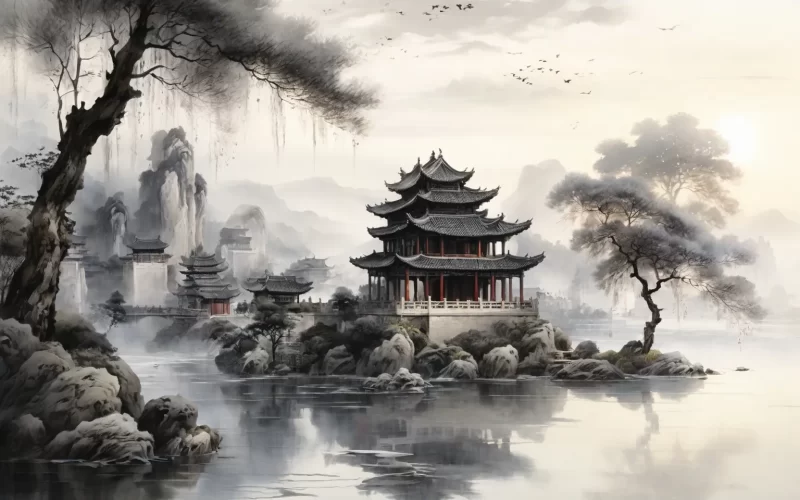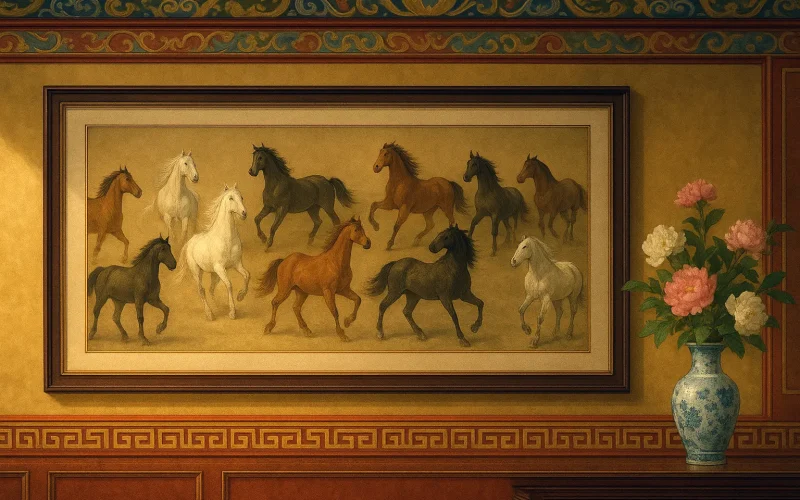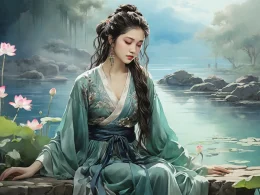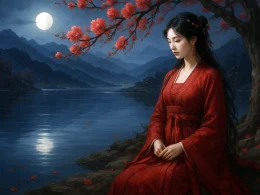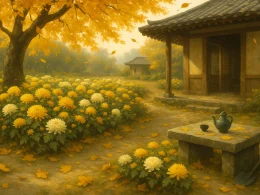News at this far western station! The north has been recaptured!
At first I cannot check the tears from pouring on my coat --
Where is my wife? Where are my sons?
Yet crazily sure of finding them, I pack my books and poems- -
And loud my song and deep my drink
On the green spring-day that starts me home,
Back from this mountain, past another mountain,
Up from the south, north again-to my own town!
Original Poem
「闻官军收河南河北」
杜甫
剑外忽传收蓟北, 初闻涕泪满衣裳。
却看妻子愁何在? 漫卷诗书喜欲狂。
白日放歌须纵酒, 青春作伴好还乡。
即从巴峡穿巫峡, 便下襄阳向洛阳。
Interpretation
The poem Both Sides of the Yellow River Recaptured by the Imperial Army was written in the spring of the first year of the Guangde era (763 AD) during the reign of Emperor Daizong of the Tang Dynasty. At that time, the An-Shi Rebellion had just ended, and the imperial army had recaptured the regions of Hebei and Henan. Du Fu, who was then residing in Zizhou, Sichuan, had suffered years of displacement and the devastation of his country and family due to the prolonged war. This filled him with a deep longing for national unity. When news of the victory reached him, the poet was overwhelmed with joy and wrote this passionate poem.
First Couplet: "剑外忽传收蓟北,初闻涕泪满衣裳。"
Jiàn wài hū chuán shōu Jì běi, chū wén tì lèi mǎn yī shang.
Suddenly, news from beyond the Sword Gate: Jibei has been recaptured. Upon first hearing, tears soaked my clothes.
The poet begins with the sudden arrival of news from beyond the Sword Gate, announcing the recapture of Jibei. The phrase "tears soaked my clothes" vividly captures the poet's overwhelming emotion upon hearing the news, reflecting his deep joy and relief after years of turmoil.
Second Couplet: "却看妻子愁何在?漫卷诗书喜欲狂。"
Què kàn qī zǐ chóu hé zài? Màn juǎn shī shū xǐ yù kuáng.
Turning to look at my wife and children, where is their sorrow now? Hastily rolling up my books, I am wild with joy.
This couplet shifts the focus to the poet's family, whose sorrow has vanished with the news of victory. The poet, too, is too excited to focus on reading, casually rolling up his books. The actions of "turning to look" and "hastily rolling up" vividly depict the transition from sorrow to joy, emphasizing the family's shared relief and happiness.
Third Couplet: "白日放歌须纵酒,青春作伴好还乡。"
Bái rì fàng gē xū zòng jiǔ, qīng chūn zuò bàn hǎo huán xiāng.
In broad daylight, I must sing and drink freely. With spring as my companion, it's the perfect time to return home.
The poet expresses his unrestrained joy, envisioning a celebratory return home. "Singing and drinking freely" in broad daylight reflects his elation, while "spring as my companion" symbolizes renewal and hope, underscoring the poet's optimism for the future.
Fourth Couplet: "即从巴峡穿巫峡,便下襄阳向洛阳。"
Jí cóng Bā xiá chuān Wū xiá, biàn xià Xiāngyáng xiàng Luòyáng.
I will pass through the Ba Gorge and Wu Gorge, then head from Xiangyang to Luoyang.
The final couplet maps out the poet's imagined journey home, linking place names to convey his eagerness. Though physically in Sichuan, his heart is already in Luoyang, illustrating his deep longing for home and the emotional intensity of his anticipation.
Overall Appreciation
This poem is sincere in emotion and unrestrained in language, filled with the poet's joy at national unity and his deep yearning for his homeland. The poem progresses from "hearing the news" to "rejoicing" and finally to "returning home," with emotions surging like a mighty river. The poet fully releases his feelings without restraint, showcasing Du Fu's straightforward and genuine personality.
Writing Characteristics
- Sincere Emotion, Direct Expression: The poet uses phrases like "tears soaked my clothes" and "wild with joy" to directly express his excitement, without any pretense, allowing his emotions to flow naturally.
- Lively Language, Energetic Rhythm: The poem's language is concise and lively, with passionate emotions that rush forward like a river, resonating deeply with readers.
- Skillful Use of Verbs, Vivid Imagery: Verbs such as "suddenly," "turning to look," and "hastily rolling up" create vivid imagery, intensifying the poet's state of excitement and joy.
Insights
This poem allows us to feel the preciousness of peace and the depth of patriotic sentiment. After enduring the hardships of war and displacement, Du Fu's longing for home and reunion was particularly intense. The poem reminds us that even in times of suffering, we should hold onto hope and cherish every moment of peace and the happiness of reunion.
Poem translator
Kiang Kanghu
About the poet

Du Fu (杜甫), 712 - 770 AD, was a great poet of the Tang Dynasty, known as the "Sage of Poetry". Born into a declining bureaucratic family, Du Fu had a rough life, and his turbulent and dislocated life made him keenly aware of the plight of the masses. Therefore, his poems were always closely related to the current affairs, reflecting the social life of that era in a more comprehensive way, with profound thoughts and a broad realm. In his poetic art, he was able to combine many styles, forming a unique style of "profound and thick", and becoming a great realist poet in the history of China.






